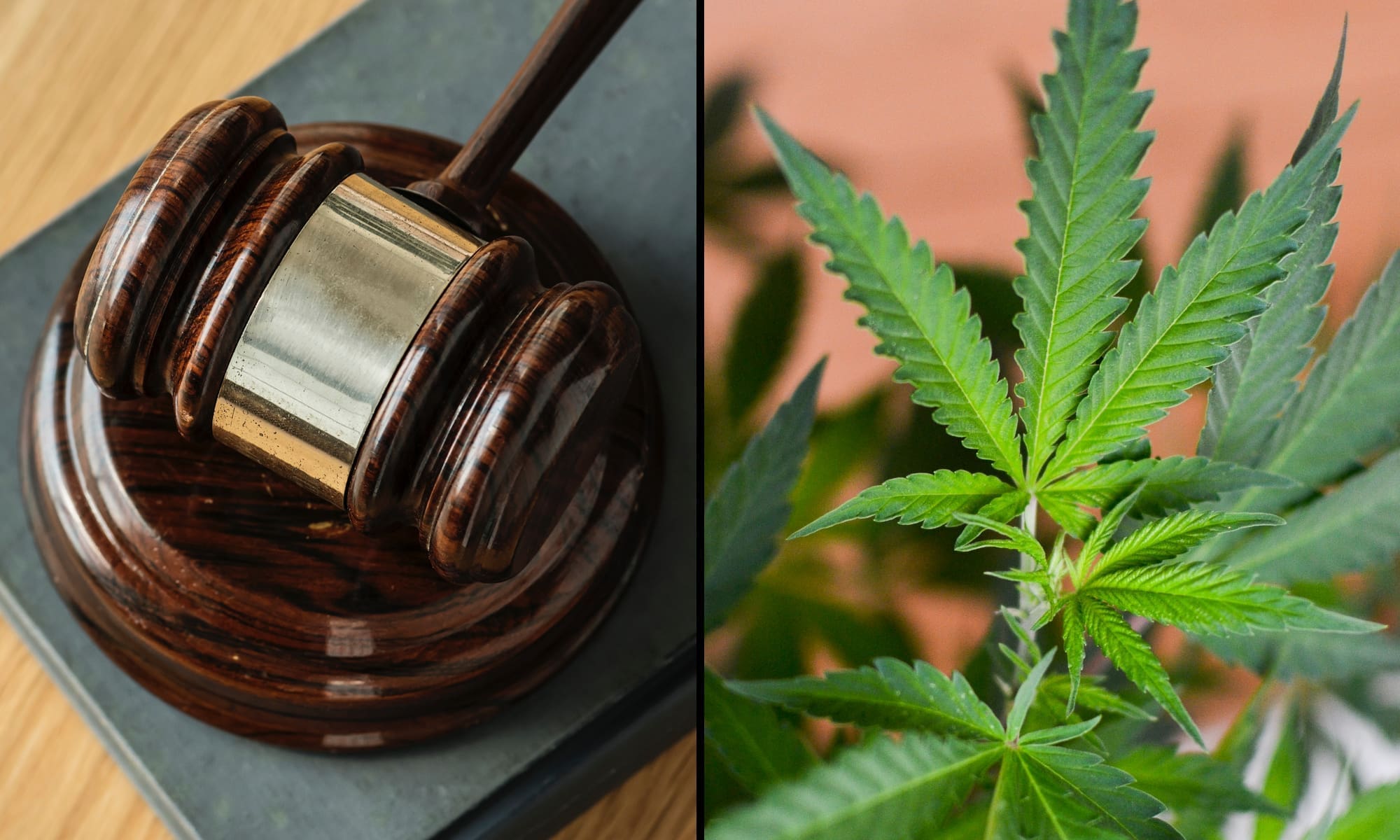featured
Rand Paul Is Working To ‘Reach A Compromise’ On Hemp THC Product Laws With McConnell And House Lawmakers
Published
1 week agoon

A Republican senator says he has plans to meet with House lawmakers to “reach a compromise” on an approach to regulate hemp in light of his opposition to a proposal in Congress to ban products with any “quantifiable” amount of THC.
Part of that compromise, he said, is to address concerns he and other stakeholders have about vague language that leaves it up to the U.S. Department of Health and Human Services (HHS) under Secretary Robert F. Kennedy Jr. to determine what constitutes a “quantifiable” amount. Without specifications, the worry it that essentially all consumable cannabinoid products could end up being re-criminalized.
After preventing the ban from being incorporated into a Senate agriculture spending bill passed by the body last week, Sen. Rand Paul (R-KY) wrote in an op-ed published by The Courier Journal on Thursday that he’s still discussing the issue with its proponent, Sen. Mitch McConnell (R-KY).
The debate has created tension between the Kentucky senators, with Paul pushing for regulations that he said would promote public safety while preserving the hemp industry that’s proliferated since the crop was federally legalized under the 2018 Farm Bill—a reform that McConnell played a key role in advancing.
But while McConnell has contested the idea that the legislation he sponsored would “completely destroy” the market, as Paul and industry stakeholders have insisted, he ultimately agreed to pull the language from the agriculture bill following Paul’s procedural protest. The Senate passed the underlying legislation last week.
“My opposition to the amendment proposed by Sen. McConnell is that it would essentially set the legal limit of THC in CBD products to zero,” Paul said in the op-ed. “The hemp industry has warned that completely prohibiting a naturally occurring substance will destroy the industry, in part because customers likely buy these products for the perceived health benefits of low levels of THC.”
“Further, the proposed reform is vague and would criminalize hemp products like CBD oil if they contain only a ‘quantifiable amount’ of THC, as determined by the Secretary of Health and Human Services,” he said. “My concern is that this non-specific law could be interpreted to mean zero THC, which would not only be nearly impossible to produce, but also may have no customer base.”
“This is why the hemp industry worries it could be killed by reforms that are not well thought out.”
McConnell disputed that point in a separate op-ed, as well as on the Senate floor where he lambasted opponents of his proposed hemp ban, calling out Paul without explicitly naming him.
Paul, for his part, hasn’t denied problems in the intoxicating hemp market, writing that some distributors “are skirting the legal limits by overly enhancing the concentrations of certain cannabinoids in their hemp products.”
“I believe a compromise can be reached in which the hemp industry continues to grow while also providing safe products to consumers.”https://t.co/TPkJIEUh7S
— Senator Rand Paul (@SenRandPaul) August 7, 2025
“As a consequence, some of these products are dangerous and, in some states, available to underage youths, prompting reform efforts,” he said, adding that both he and the industry at large are “open to reforms that prevent ‘juicing up’ hemp products, like hemp beverages, with purely synthetic cannabinoids of unknown origin that may cause reactions similar to marijuana.”
“At least 25 states have already instituted age limits and THC levels for such products. I have no objection to many of these reforms,” Paul said. “Ideally, the reforms would occur at the state level and maintain a reasonably low dose of delta-9 THC in the finished product.”
However, he wrote that regulations limiting THC levels in hemp products “should not set a target so low it can’t be physically attained,” and they shouldn’t “set targets so low that the product loses its intended effect, which is most often to manage pain or anxiety.”
“Any reform to the legal treatment of hemp must ensure that the industry has the opportunity to thrive while promoting consumer safety,” he said.
The senator said he remains “engaged in discussions with Senator McConnell and other interested members, and we have plans to meet with members of the House of Representatives in the near future to reach a compromise.”
“These discussions provide us with the opportunity to inject some common sense into the regulatory framework for hemp. Currently, if a single hemp plant exceeds the .3 percent delta-9 THC limit, regulations require the entire field be plowed under and a year’s crop is lost. Regulations should focus on finished, consumable hemp products rather than the hemp plants and the farmers that grow them. Any reform should acknowledge that hemp grown for industrial uses, like hemp wood, should not require testing at all, which would result in less waste for hemp famers.”
“Reasonable and clear statutory guidelines that ensure the viability of the hemp industry and the safety of its products is preferable to using the law to smash a market that is currently depended upon by Kentucky farmers, business owners and consumers,” Paul said. “If all interested parties act in good faith, I believe a compromise can be reached in which the hemp industry continues to grow while also providing safe products to consumers.”
The hemp language in the Senate spending bill, prior to being removed, was nearly identical to what the House Appropriations Committee passed in June, with noted cannabis prohibitionist Rep. Andy Harris (R-MD) leading the charge.
Meanwhile, Paul recently filed a standalone bill that would go in the opposite direction of the hemp ban, proposing to triple the concentration of THC that the crop could legally contain, while addressing multiple other concerns the industry has expressed about federal regulations.
The senator introduced the legislation, titled the Hemp Economic Mobilization Plan (HEMP) Act, in June. It mirrors versions he’s sponsored over the last several sessions.
Harris, for his part, told Marijuana Moment that he wasn’t concerned about any potential opposition to the hemp ban in the Senate—and he also disputed reports about the scope of what his legislation would do to the industry.
The Congressional Research Service (CRS) released a report in June stating that the legislation would “effectively” prohibit hemp-derived cannabinoid products. Initially it said that such a ban would prevent the sale of CBD as well, but the CRS report was updated to exclude that language for reasons that are unclear.
The hemp language is largely consistent with appropriations and agriculture legislation that was introduced, but not ultimately enacted, under the last Congress.
Hemp industry stakeholders rallied against that proposal, an earlier version of which was also included in the base bill from the subcommittee last year. It’s virtually identical to a provision of the 2024 Farm Bill that was attached by a separate committee last May via an amendment from Rep. Mary Miller (R-IL), which was also not enacted into law.
A leading alcohol industry association, meanwhile, has called on Congress to dial back language in the House spending bill that would ban most consumable hemp products, instead proposing to maintain the legalization of naturally derived cannabinoids from the crop and only prohibit synthetic items.
Wine & Spirits Wholesalers of America (WSWA) President and CEO Francis Creighton said in a press release that “proponents and opponents alike have agreed that this language amounts to a ban.”
Separately, key GOP congressional lawmakers—including one member who supports marijuana legalization—don’t seem especially concerned about provisions in the bill despite concern from stakeholders that it would put much of the hemp industry in jeopardy by banning most consumable products derived from the plant.
—
Marijuana Moment is tracking hundreds of cannabis, psychedelics and drug policy bills in state legislatures and Congress this year. Patreon supporters pledging at least $25/month get access to our interactive maps, charts and hearing calendar so they don’t miss any developments.![]()
Learn more about our marijuana bill tracker and become a supporter on Patreon to get access.
—
Jonathan Miller, general counsel at the U.S. Hemp Roundtable, told congressional lawmakers in April that the market is “begging” for federal regulations around cannabis products.
At the hearing, Rep. James Comer (R-KY) also inquired about FDA inaction around regulations, sarcastically asking if it’d require “a gazillion bureaucrats that work from home” to regulate cannabinoids such as CBD.
A report from Bloomberg Intelligence (BI) last year called cannabis a “significant threat” to the alcohol industry, citing survey data that suggests more people are using cannabis as a substitute for alcoholic beverages such a beer and wine.
Last November, meanwhile, a beer industry trade group put out a statement of guiding principles to address what it called “the proliferation of largely unregulated intoxicating hemp and cannabis products,” warning of risks to consumers and communities resulting from THC consumption.
Photo courtesy of Pixabay.

Author: mscannabiz.com
MScannaBIZ for all you Mississippi Cannabis News and Information.
You may like
-


Massachusetts Auditor Notes ‘Violations’ and ‘Mismanagement’ At Cannabis Control Commission
-


Supreme Court Gives Marijuana Companies More Time To File Petition In Case Challenging Federal Prohibition
-


Canopy USA Appoints New Executive Team to Accelerate Growth
-


Washington Adult-Use Cannabis Sales Decline for Fifth Straight Year
-


Delaware Governor Seeks Marijuana Regulation Advice From Colorado Counterpart As State’s Legal Market Launches
-


Major trucking group’s cannabis rescheduling concerns (Newsletter: August 18, 2025)
featured
Massachusetts Auditor Notes ‘Violations’ and ‘Mismanagement’ At Cannabis Control Commission
Published
9 minutes agoon
August 18, 2025
Massachusetts Auditor Diana DiZoglio last week released an audit of the state’s Cannabis Control Commission (CCC), claiming to have uncovered violations and mismanagement issues at the commission, NBC Boston reports.
The audit found that officials “failed to take appropriate steps and institute procedures” to guarantee the administering of cannabis industry license extensions, and that a “lack of supervision and minimal accountability over licensing staff members” helped contribute to the breakdown.
“CCC’s mismanagement of prorated fees for license extensions resulted in procedural inequity, revenue loss, and noncompliance with state regulations.” — Excerpt from the audit summary
The commission said it has “been working closely with the State Auditor’s Office for almost a year and will review the report released today in furtherance of our shared commitment to government improvement. Over the course of the audit period and since, the Commission has hired key leaders, made progress to address many of the issues referenced, and begun to move forward in a constructive way.”
The report was released hours after the commission voted unanimously to reinstate the license of Assured Testing, a testing lab accused of failing to report thousands of contaminated cannabis samples, the report said. The commission issued penalties against the lab, including a $300,000 fine and two years of probation. Additionally, the lab — which has publicly disagreed with the findings but says it will honor the commission’s terms for reinstatement — will have to hire an independent auditor, an internal control manager, and a new interim CEO.
“We are eager to return to what we do best: delivering scientific, evidence-backed testing with industry-leading cannabis expertise,” Assured Testing said in a statement.

Author: mscannabiz.com
MScannaBIZ for all you Mississippi Cannabis News and Information.
featured
Supreme Court Gives Marijuana Companies More Time To File Petition In Case Challenging Federal Prohibition
Published
1 hour agoon
August 18, 2025
The U.S. Supreme Court has granted a request to give marijuana companies suing the Justice Department in an effort to overturn federal prohibition two more months to file their petition with the justices.
Lawyers for the cannabis firms said the extension was needed due to the “significant and complex constitutional issues” that are being raised in the case, as well as the fact that state governments and other experts who plan to file support briefs need more time to “carefully craft their arguments.”
The prominent litigation firm Boies Schiller Flexner LLP that’s representing the companies—Canna Provisions, Gyasi Sellers, Wiseacre Farm and Verano Holdings—entered a request for a 60-day extension to submit its writ of certiorari last week. Justice Ketanji Brown Jackson approved the proposal on Friday, pushing back the current deadline of August 25 to October 24.
The companies’ request noted that counsel for the Office of the Solicitor General don’t oppose the extension.
The brief gave three reasons for the request: 1) the lead attorney on the case, David Boies, is “heavily engaged in previously scheduled matters” before other federal courts, 2) several experts who expressed interest in supporting their lawsuit with amicus briefs have said they need more time and 3) the case involves complex legal issues that require more in-depth consideration.
“This case presents significant and complex constitutional issues concerning both state-regulated marijuana specifically and the authority of Congress to regulate purely intrastate commerce generally,” the filing says. “The additional time will permit counsel to prepare a petition that appropriately addresses the questions of nationwide importance raised by this case.”
That includes “the question of whether [Gonzales v. Raich] was correctly decided,” it says, referencing a landmark 2005 Supreme Court ruling, wherein justices narrowly determined that the federal government could enforce prohibition against cannabis cultivation that took place wholly within California based on Congress’s authority to regulate interstate commerce.
With respect to future amicus briefs the applicants are expecting, they said “counsel have heard from law professors, non-profits, state governments, and others interested in submitting amicus briefs in these proceedings, and several of these potential amici have expressed concern about having sufficient time to prepare over the summer.”
“An extension will provide potential amici adequate time to consider the case and carefully craft their arguments,” the filing says.
This comes about three months after a U.S. appeals court rejected the arguments of the state-legal cannabis companies, one the latest blow to the high-profile lawsuit following a lower court’s dismissal of the claims. But it’s widely understood that the plaintiffs’ legal team has long intended the matter to end up before the nine justices.
“It’s fair to assume that we shall seek Supreme Court review,” attorney Jonathan Schiller told Marijuana Moment in June.
The latest filing concludes by saying respondents “will not suffer any prejudice from the requested extension,” and because “the First Circuit affirmed the dismissal of Applicants’ claims, a brief extension will not in any way alter the status quo of this case.”
While it remains to be seen whether the high court will ultimately take the case, one sign that at least some on court might be interested in the appeal is a 2021 statement from Justice Clarence Thomas, issued as the court denied review of a separate dispute involving a Colorado medical marijuana dispensary.
Thomas’s comments seemed to suggest that it’d be appropriate revisit Raich—a move that could largely upend federal prohibition.
The statement pointed to policy developments since the earlier case was decided, such as the hands-off enforcement approach taken by the Department of Justice as more states legalized cannabis and a congressional budget rider protecting state-legal medical marijuana programs.
“Whatever the merits of Raich when it was decided, federal policies of the past 16 years have greatly undermined its reasoning,” Thomas wrote, describing the government’s approach to cannabis enforcement as “a half-in, half-out regime that simultaneously tolerates and forbids local use of marijuana.”
“Though federal law still flatly forbids the intrastate possession, cultivation, or distribution of marijuana…the Government, post-Raich, has sent mixed signals on its views,” the justice continued, saying the situation “strains basic principles of federalism and conceals traps for the unwary.”
Once plaintiffs in the case at hand file their forthcoming petition for a writ of certiorari, it would need needs the votes of four justices to put the case before the Supreme Court.
The initial complaint, filed in U.S. District Court for the District of Massachusetts, argued that government’s ongoing prohibition on marijuana under the Controlled Substances Act (CSA) was unconstitutional because Congress in recent decades had “dropped any assumption that federal control of state-regulated marijuana is necessary.”
At oral argument on appeal late last year, Boies told judges that under the Constitution, Congress can only regulate commercial activity within a state—in this case, around marijuana—if the failure to regulate that in-state activity “would substantially interfere [with] or undermine legitimate congressional regulation of interstate commerce.”
Judges, however, said they were “unpersuaded,” ruling in last month’s opinion that “the CSA remains fully intact as to the regulation of the commercial activity involving marijuana for non-medical purposes, which is the activity in which the appellants, by their own account, are engaged.”
The district court, meanwhile, said in the case that while the there are “persuasive reasons for a reexamination” of the current scheduling of cannabis, its hands were effectively tied by past U.S. Supreme Court precedent in Raich.
Meanwhile, amid a series of legal challenges, the Trump administration recently asked the Supreme Court to take up a case on the federal government’s ban on users of marijuana and other illegal drugs from owning firearms and uphold the prohibition, saying it is consistent with the Second Amendment.
Separately at the federal level, a pending Biden-era recommendation to reschedule marijuana to the less restrictive Schedule III of the CSA is remains stalled.
The MAGA world is divided on how it wants President Donald Trump to come down on that proposal, with key right-wing influencers voicing conflicting positions on the issue after the president announced an imminent decision last week.
While Trump endorsed moving marijuana to Schedule III during last year’s presidential campaign—along with cannabis industry banking access and a Florida legalization ballot initiative that ultimately fell short—last week he merely said he is considering the issue, with a decision expected within weeks.
The overall bipartisanship of the issue, however, was also reflected in recent comments from one Democratic and one Republican member of Congress, who urged Trump to federally reschedule marijuana.
A new political committee that shares the same treasurer as Trump’s own super PAC is also pushing the president to follow through on rescheduling marijuana, releasing an ad that highlights his previous endorsement of the reform on the campaign trail.
Photo elements courtesy of rawpixel and Philip Steffan.

Author: mscannabiz.com
MScannaBIZ for all you Mississippi Cannabis News and Information.
featured
Canopy USA Appoints New Executive Team to Accelerate Growth
Published
2 hours agoon
August 18, 2025
[PRESS RELEASE] – BOULDER, Colo., Aug. 18, 2025 – Canopy USA LLC, a brand-driven organization strategically positioned across the fastest-growing states and highest potential segments of the U.S. cannabis market, announced the appointment of a new executive team responsible for driving the company’s next phase of expansion.
Drawing on extensive industry experience, these leaders will steer Canopy USA forward through a shared vision to elevate the company’s brand portfolio, enhance day-to-day operations and execution, and advance growth initiatives across multiple state markets.
- Casey Rash, chief financial officer, will oversee centralized functions including finance, human resources and IT. Rash brings deep expertise in regulated industries and a strategic approach to driving organizational scale and efficiency.
- Rebecca Kirk, chief operating officer, will lead the company’s operations, innovation and legal teams. Known for building scalable systems and launching category-leading products, Kirk will play a critical role in driving Canopy USA’s performance across its value chain.
- Kelly Flores, chief business development officer, will be responsible for marketing, market expansion and product strategy. With a proven track record in cannabis commercialization, Flores will guide brand development and strategic growth initiatives in both existing and emerging state markets.
“These leadership appointments mark the start of a plan to capture growth in the U.S. cannabis market,” Canopy USA President Brooks Jorgensen said. “Within the best of each Acreage, Jetty and Wana, we’ve been aligning systems, teams and processes across markets to create a scalable, efficient organization. With our leadership team now in place, we’re moving forward with purpose.”
Canopy USA’s platform is built to deliver consistent quality, innovative products and trusted brands to consumers and retail partners nationwide. By combining deep market expertise with a focus on execution, the company aims to set the standard for growth and leadership in the evolving U.S. cannabis industry.

Author: mscannabiz.com
MScannaBIZ for all you Mississippi Cannabis News and Information.

Massachusetts Auditor Notes ‘Violations’ and ‘Mismanagement’ At Cannabis Control Commission

Supreme Court Gives Marijuana Companies More Time To File Petition In Case Challenging Federal Prohibition

Canopy USA Appoints New Executive Team to Accelerate Growth

Washington Adult-Use Cannabis Sales Decline for Fifth Straight Year

Delaware Governor Seeks Marijuana Regulation Advice From Colorado Counterpart As State’s Legal Market Launches

Major trucking group’s cannabis rescheduling concerns (Newsletter: August 18, 2025)

From The Vault: The HIGH TIMES interview Allen Ginsberg (1992)

Court throws out part of New York’s marijuana licensing rules

Watch Immigration Enforcement Rattles the Cannabis Industry | SoCal Matters Season 2025

Two arrested as police close four unlicensed cannabis shops in Seneca Falls

High-potency cannabis use linked to psychosis | Watch News Videos Online

High Times Strains Of The Month: August 2025

Texas Crime Labs Say They Don’t Have Enough Resources To Test Hemp Products For THC As Lawmakers Consider Ban

Trump on changes to marijuana policy: 'We're looking at it'

Realtors’ Stolen Credit Cards Are Used to Build an Illegal Marijuana Farm

Grady County Sheriff's Office makes arrests in illegal marijuana bust

High Times Was The Most Influential Publication Of My Life

Revelry NYC 2025: Inside New York’s Cannabis Culture & Industry Festival

Revelry NYC 2025: Inside New York’s Cannabis Culture & Industry Festival

Indian Tribes See Opportunity In Hemp THC Products, Even In States That Continue Marijuana Criminalization

Two Oakland cannabis dispensaries targeted again by ram-raiding burglars

Trump on changes to marijuana policy: 'We're looking at it'

Bill Maher Takes Credit for Possibility Trump Might Reshedule Marijuana

Social cannabis use rules will be published Friday

Alert: Department of Cannabis Control updates data dashboards with full data for 2023

Connecticut Appoints The US’s First Cannabis Ombudsperson – Yes there is a pun in there and I’m Sure Erin Kirk Is Going To Hear It More Than Once!

5 best CBD creams of 2024 by Leafly

EU initiative begins bid to open access to psychedelic therapies
New Study Analyzes the Effects of THCV, CBD on Weight Loss

Free delta-9 gummies from Bay Smokes

5 best autoflower seed banks of 2024 by Leafly

Discover New York’s dankest cannabis brands [September 2024]

Curaleaf Start Process Of Getting Their Claws Into The UK’s National Health System – With Former MP (Resigned Today 30/5/24) As The Front Man

May 2024 Leafly HighLight: Pink Runtz strain

Mississippi city official pleads guilty to selling fake CBD products

Press Release: CANNRA Calls for Farm Bill to Clarify Existing State Authority to Regulate Hemp Products

Local medical cannabis dispensary reacts to MSDH pulling Rapid Analytics License – WLBT

Horn Lake denies cannabis dispensary request to allow sale of drug paraphernalia and Sunday sales | News

5 best THC drinks of 2024 by Leafly

Nevada CCB to Accept Applications for Cannabis Establishments in White Pine County – “Only one cultivation and one production license will be awarded in White Pine County”

6 best CBD gummies of 2024 by Leafly

The Daily Hit: October 2, 2024

5 best delta-9 THC gummies of 2024 by Leafly

Weekly Update: Monday, May 13, 2024 including, New Guide for Renewals & May Board meeting application deadline

PRESS RELEASE : Justice Department Submits Proposed Regulation to Reschedule Marijuana

People In This State Googled ‘Medical Marijuana’ The Most, Study Shows

Thailand: Pro-cannabis advocates rally ahead of the government’s plan to recriminalize the plant

5 best THCA flower of 2024 by Leafly
Trending
-

 California Cannabis Updates1 year ago
California Cannabis Updates1 year agoAlert: Department of Cannabis Control updates data dashboards with full data for 2023
-

 Breaking News1 year ago
Breaking News1 year agoConnecticut Appoints The US’s First Cannabis Ombudsperson – Yes there is a pun in there and I’m Sure Erin Kirk Is Going To Hear It More Than Once!
-

 best list1 year ago
best list1 year ago5 best CBD creams of 2024 by Leafly
-

 Business11 months ago
Business11 months agoEU initiative begins bid to open access to psychedelic therapies
-

 cbd1 year ago
cbd1 year agoNew Study Analyzes the Effects of THCV, CBD on Weight Loss
-

 Bay Smokes1 year ago
Bay Smokes1 year agoFree delta-9 gummies from Bay Smokes
-

 autoflower seeds11 months ago
autoflower seeds11 months ago5 best autoflower seed banks of 2024 by Leafly
-

 cannabis brands11 months ago
cannabis brands11 months agoDiscover New York’s dankest cannabis brands [September 2024]



